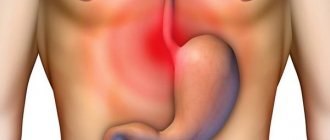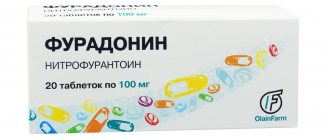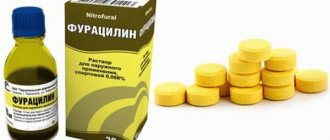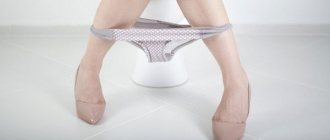How to quickly relieve the symptoms of cystitis by heating
The main “helper” in getting rid of signs of the inflammatory process is heat. It affects the blood vessels, dilating them and thereby relieving pain. For cystitis, the following procedures are indicated:
- Applying a warm heating pad to the lower abdomen and groin area. You can also use bags filled with hot sand or salt. Some people use a regular plastic bottle filled with heated water (the main requirement is that the material of the container must be dark in color).
- Taking a warm shower. The duration of such “therapy” is 15-20 minutes. If opinions differ about the bath, then taking a shower when the bladder is inflamed is not only possible, but even useful.
- "Bathing" feet. It takes 15-25 minutes to steam your feet. Various herbal decoctions (from chamomile, St. John's wort, etc.), heated milk, and plain water can be used as a “healing” liquid. It is necessary to ensure that your feet do not get cold. As soon as the liquid begins to cool, it is recommended to add a new portion at a higher temperature.
- Sitting over a hot brick. The procedure itself is simple, but it will require the construction of a special structure. You need to put several pieces of brick heated in the oven in a metal bucket, line the edge of the vessel with a thick cloth and sit on it, having first removed your underwear. You should act carefully so as not to accidentally get burned. It is recommended to sit in this way for up to 20 minutes until the brick cools down.
It is very important after completing the thermal procedure to put on woolen socks and go under the blanket. Therefore, it is best to engage in such treatment immediately before bedtime.
Heating also has contraindications, including:
- hematuria - bleeding along with urine (heat will further increase bleeding);
- period of menstruation in women;
- general severe course of the inflammatory process, accompanied by fever, weakness, and headaches.
Special mention should be made of visiting baths and saunas. Many people believe that this is how cystitis can be cured quickly. In fact, in the acute form of the disease, such visits will only worsen the patient’s condition. Going to a bathhouse or sauna is only permissible if you have chronic cystitis, and then only during the period of remission.
Symptoms of cystitis in women
The first signs of cystitis in the female half of the population are:
- frequent scanty urination, accompanied by pain and discomfort in the lower abdomen;
- increase in body temperature to 37 degrees and above;
- Strong headache;
- cloudiness of urine and change in color (even brown);
- the appearance of blood in the urine.
In young children, bladder inflammation is difficult to identify, since an infant who cannot speak will not be able to tell where and what hurts. Symptoms of cystitis can only be accompanied by whims and incessant crying of the baby.
It’s easier with older children, but when unpleasant symptoms appear, children will not be able to explain the nature and course of the painful symptoms. Only with a random urine test can a sluggish or acute form of cystitis be detected.
Cystitis: how to cure quickly and get rid of symptoms in one day
There is a way to literally remove the signs of the disease within a day. If the disease has just begun to develop, there is a chance to stop it. Required:
- Analgin (or other painkiller suitable for the person);
- a heating pad or something that replaces it;
- 1 tbsp. l. regular baking soda;
- 500 ml freshly squeezed lemon juice;
- homemade cranberry drink (juice, fruit drink, compote).
You need to devote the whole day to treatment and stay at home. Need to:
- Take a soda solution. This substance helps to change the pH level of urine, due to which microbes stop multiplying in it, and the inflammatory process stops developing. Additionally, pain disappears. To prepare the solution, pour baking soda into a glass of water (necessarily warm) and mix thoroughly. Drink the drink in small sips for 10-20 minutes.
- Relax. It is recommended to devote the next half hour to being under a warm blanket and taking a light nap.
- Take an Analgin tablet.
- Use “thermal techniques”. You should press a heating pad to your lower abdomen. It is advisable to keep it in this position for about 2 hours. In order not to have to get out of bed to constantly heat the water, it is recommended to “stock up” with an assistant among the household. But if there are contraindications for heat treatment, this step must be skipped.
- Drink cranberry drink and lemon juice diluted with water. It is recommended to stretch this point over the whole day. It is best to take drinks every 20 minutes.
One of the ways to cure cystitis quickly is to change your diet. The new menu can also be included in your “treatment day”. You need to consume as much as possible:
- fresh cranberry or lingonberry berries;
- natural diuretic products (watermelon, melons, cucumbers);
- millet porridges and soups.
It is recommended to avoid all kinds of “harmful” foods, including fried, salted, spicy, canned, smoked, and pickled foods. Carbonated lemonades and alcoholic drinks are prohibited.
Acute cystitis: quickly treated with antibiotics
The use of potent medications should be discussed with your doctor. But if there is no way to wait, it is permissible to take a risk and take the most effective antibiotic - Monural. It is effective against almost all bacteria, which is why it is sometimes prescribed even before test results are available, simply to stop the infection.
Monural is a powder that is diluted with water according to the instructions and taken either 2 hours before meals or before bed. The last option is considered preferable. It is very important to urinate before using the solution, so that the medicine can remain in the bladder for the next few hours and have the desired effect on it.
Usually the symptoms of cystitis go away the next day. If the situation is difficult, it is permissible to take the medication again after a day. The drug does not provoke dysbacteriosis and is generally considered safe. It is prescribed to nursing mothers and even pregnant women (although in these situations, consultation with a doctor is strictly required).
How to relieve the symptoms of cystitis quickly: painkillers + traditional medicine methods
To ensure the symptoms disappear as quickly as possible, you can take a painkiller, and then devote the day to actively drinking herbal teas recommended for cystitis. Suitable medications include:
- Analgin is a common pain reliever that relieves discomfort in half an hour;
- No-spa is an antispasmodic that dilates blood vessels;
- Trigan-D is a remedy for relieving intense pain attacks.
You can take another drug that the person usually prefers. Also, in the morning you should prepare one of the following drinks:
- A decoction of rosehip roots. For 1 liter of water, 0.5 cups of crushed plant is required. Boil. Take before meals at least five times a day.
- Infusion of hop cones. Pour 2 tbsp. l. plants 0.5 liters of boiling water. After 1.5 hours you can take the medicine. Drink 0.5 cups before meals.
- Chicory infusion. Prepare and take in the same way as the previous recipe.
- St. John's wort infusion. Brew 1 tbsp. l. plants in 0.5 liters of boiling water. Strain. Drink 0.25 cups before meals.
Therapy needs to be “organized” according to how you feel. If the remedy does not help, it is better to consult a specialist. After all, in fact, only a doctor can tell you how to quickly cure cystitis in a particular case. The causative agents of the inflammatory process are different - and require different approaches. Home therapy is always a risk.
Traditional painkiller recipes for cystitis
Decoctions, teas and tinctures of medicinal herbs can be made as anesthetics. The most common recipes:
- Add a teaspoon of chamomile and horsetail to half a liter of boiling water. Let it brew until the broth cools to room temperature and drink in small sips throughout the day.
- Add a teaspoon of corn silk, bear's ears and St. John's wort to 500 ml of boiling water. The decoction should be infused for 2 hours, after which it is taken before meals during the day.
- Add a spoonful of honey and half a spoonful of apple cider vinegar to a glass of hot water. Mix thoroughly and drink after eating.
- Add two tablespoons of crushed hop cones to 0.5 boiling water. The resulting composition should be infused for 1.5 hours. After this, it is warmed to room temperature and drunk in half a glass.
It is possible to relieve pain using traditional methods if the disease does not occur in an acute form. With such cystitis, the pain is severe and cannot be avoided without timely help. In addition, traditional methods must be used for a long time. However, as a rule, they not only relieve pain, but also help strengthen the body.
How to relieve pain from cystitis in women at home
Cystitis is a disease characterized by inflammation of the bladder. Most often, the pathology occurs in women. The disease immediately makes itself felt, as the patient feels discomfort. To make you feel better and relieve pain, you should use painkillers. In the absence of the necessary medications, some folk remedies and techniques will help alleviate the woman’s condition.
Cystitis is an inflammation of the mucous membrane of the bladder due to the development of a bacterial infection. There are two types of inflammatory process: primary and secondary. Primary develops as an independent pathology. It occurs in acute, sometimes chronic form and is accompanied by severe pain and discomfort. It is characterized by pain syndromes. Secondary is a consequence of the development of a disease of the genitourinary system. Its symptoms do not appear immediately.
The bladder is normal and with cystitis
In women, the more frequent manifestation of cystitis is explained by the anatomical features of the structure of the body. Compared to men, their urethra is much wider and shorter, and is located close to the vagina. Therefore, it is much easier for pathogenic microorganisms to enter the bladder and cause inflammation.
Cystitis occurs at any age: both in little girls and in older women. It is much more difficult to detect the disease during menopause and in children, since the pathology is practically asymptomatic.
Signs of cystitis appear almost immediately:
- Frequent desire to go to the toilet.
- Acute attacks of pain in the lower abdomen.
- Change in the color of urine, presence of sediment in it.
- The appearance of a pungent odor.
- Burning in the perineum, especially when urinating.
- Feeling of the bladder not being empty.
- Discomfort in the pelvic area, pubic area.
- Weakness, drowsiness.
- Involuntary urination when sneezing or coughing, in which urine leaves the body uncontrollably in small portions.
Such symptoms are observed in women at the initial stage of the disease. If you do not start treating cystitis in a timely manner, the following signs appear:
- It becomes very painful when urinating.
- In urine there are inclusions of blood and clots of pus.
- Feeling worse.
- There is pain during sexual intercourse.
- The body gets tired quickly, and fever is possible.
With cystitis, the bladder does not empty completely at one time, since urine comes out in small portions. It is best to endure the pain and make several attempts to release all the urine. Its accumulation will provoke the proliferation of bacteria.
Every tenth woman experiences cystitis during pregnancy. This is due to a general decrease in immunity to protect the fetus from maternal antibodies. As a result, the body's vulnerability to various infections increases. Additionally, the hormonal levels change, which disrupts the normal microflora of the vagina. This is how pathogenic microorganisms begin to become active. Due to the enlargement of the uterus, the pelvic organs are compressed and blood circulation is disrupted, which also reduces local immunity.
The treatment of cystitis in pregnant women has its own characteristics. It must be carried out strictly under the supervision of a specialist. Drugs are selected that do not have a harmful effect on the fetus due to the content of toxic substances.
Leaving cystitis unattended during pregnancy is strictly prohibited. The disease at an advanced stage provokes kidney problems and leads to severe complications that threaten the lives of the mother and child.
Among the safest drugs for pregnant women are Amoxiclav and Monural. The dose is prescribed exclusively by a specialist. The best treatment is to inject the drug into the bladder through a catheter. This procedure is not always safe and has a number of contraindications.
To combat cystitis and the pain experienced during the disease, various groups of drugs are used:
| Group of drugs | Description |
| Analgesics | Such drugs must be non-narcotic in nature and prescribed strictly by a doctor. They are used in cases of unbearable pain. Such remedies stop the spasm completely. Analgesics include aspirin and analgin. For pain relief, drugs that act exclusively on the organs of the urinary system (Uropirin) can be prescribed. |
| Antispasmodics | Relieves spasms and relieves pain. With their help, the process of urine output becomes less unpleasant, as the urethra relaxes. Spasm of the bladder and pain during urination, caused by excessive contraction of the muscles of the organ, are eliminated by the direct action of drugs |
| Antibiotics | They are prescribed by a doctor after a series of studies to determine the causative agent of the disease. After the tests, the patient uses antibiotics that destroy certain microorganisms. If the cause of cystitis is E. coli, then experts prescribe penicillin drugs, the list of which includes Amoxiclav. Pain decreases very quickly after taking antibiotics |
| Antiviral drugs | Cystitis is often caused by viruses. This type of disease develops 1-2 weeks after a cold. This group of drugs helps not only destroy the virus itself, but also strengthen the immune system by activating natural antiviral immunity |
| Antifungal drugs | If the cause of cystitis is a fungal infection, then the best means to combat the disease will be the drug Ketoconazole, which is available in the form of suppositories and tablets, as well as Griseofulvin |
In the absence of medications, you can reduce the discomfort from cystitis using some techniques that will also help prevent the disease from starting:
- Avoid fried, fatty, salty, spicy foods. Add more fruits and vegetables, dairy products to your diet. Drinking alcohol is prohibited.
- Drink plenty of fluids to increase urine output.
- Maintain bed rest.
- Use heat to relieve pain. It is recommended to drink hot herbal infusions that will relieve the attack. You can apply a bottle of warm water to your lower abdomen for 15-20 minutes. Additionally, foot baths are used, which will help relieve the pain a little due to blood circulation.
At home, herbal therapy helps relieve pain due to cystitis:
| Product name | Preparation |
| Infusion of horsetail and chamomile |
|
| Rose hip decoction |
|
| Honey and vinegar based product |
|
To prevent the appearance of cystitis, you must follow simple rules:
- maintain intimate hygiene - wash from front to back to prevent pathogenic bacteria from entering the vagina from the rectum;
- change pads and tampons on time, since during menstruation the greenhouse effect and blood create an ideal environment for the development of microbes;
- avoid hypothermia - you can endanger not only the bladder, but also the kidneys;
- do not use oral contraceptives - women who take them constantly are more likely to suffer from cystitis.
How to relieve pain from cystitis: a review of drugs and treatment procedures
Inflammation of the bladder is accompanied by pain and discomfort in everyday life. Frequent urge to urinate, cramping pain in the lower abdomen and lumbar region are just a few of the characteristic symptoms that accompany the disease. Painkillers for cystitis are an important component of drug therapy, but it is necessary to understand that only comprehensive treatment will permanently get rid of the pathology and its accompanying symptoms. Let's understand the nature of the disease, consider how to quickly relieve pain and stop the inflammatory process.
Etiology and diagnosis
In most cases, cystitis is secondary and develops against the background of chronic pathologies of the genitourinary system and kidneys. Predisposing risk factors are:
- infection after surgery;
- anatomical features of the urethra in women;
- concomitant diseases of the genital area;
- weakened immune system;
- diabetes;
- the presence of stones in the kidneys and urinary tract.
The diagnosis is made based on medical history, laboratory test results, and ultrasound. In some cases, an endoscopic examination is performed - cystoscopy.
Complex therapy
The main goal of treatment is to quickly relieve the symptoms of cystitis, get rid of the bacterial pathogen and prevent relapse of the disease. An adequate therapeutic regimen involves the use of the following drugs:
- Broad-spectrum antibiotics of the fluoroquinolone group: Monural, Norfloxacin, Nolitsin, Tsiprinol, Ofloxacin. They are used in short courses (1–3) days to relieve acute uncomplicated infections in patients without risk factors, which include age, pregnancy, and a history of other diseases.
- Antibacterial agents of the penicillin, sulfonamide and nitrufurin series: Fosmomycin, Amoxiclav, Gentamicin. Used according to indications as an alternative treatment for cystitis, they have a high safety profile, but require longer use - from 5 to 10 days, depending on the severity of the condition.
- Antispasmodics and non-steroidal anti-inflammatory drugs (NSAIDs). Effectively relieve pain due to cystitis, relax spasmodic pelvic floor muscles, and stop inflammatory processes.
- Antihistamines - Tavegil, Suprastin, etc.
- Immunomodulators of both synthetic and natural origin: Amiksin, Avonex, Immunal, Imudon, Derinat, tinctures of ginseng and eleutherococcus.
Scientific fact! More than 60% of patients ignore complex drug treatment, which leads to a recurrent course of the disease, functional and organic changes in the walls of the bladder.
Localization of pain during cystitis as a guide to action
Acute cystitis is accompanied by pain and, although the cornerstone of the treatment process is the use of antibacterial drugs. Question: “How to quickly relieve unpleasant symptoms and maintain mental health?” is one of the most important tasks on the path to getting rid of the disease. It should be understood that the intensity and localization of pain during cystitis indicates the severity of the processes occurring in the urinary system:
- As inflammation spreads, pain is localized in the lumbar region, gradually covering the perineum and anal canal.
- Pain when urinating is a symptom characteristic of both acute cystitis and its recurrent course.
- Urinary incontinence, accompanied by cramps in the lower abdomen, is observed in complicated stages of the disease.
Since the effect of antibiotics has a cumulative effect and does not appear earlier than after a few days, the answer to the question: “How to relieve pain with cystitis?”
Basic drugs for relieving spastic pain during exacerbation of cystitis
Let us dwell in detail on painkillers that can quickly and effectively relieve pain and relieve the unpleasant manifestations of cystitis.
- Combined drugs: Trigan-D, Dolospa Tabs, Spazmalgon. Containing paracetamol, a non-narcotic analgesic, dicycloverine or pitofenone hydrochloride, they have an anticholinergic and smooth muscle relaxant effect. Available in tablet and injection form.
- Drotaverine (No-shpa), Papaverine, Nikoshpan - a group of antispasmodic drugs. The action is aimed at relaxing smooth muscles and blood vessels, which promotes painless outflow of urine and temporary relief of the condition. In combination with anti-inflammatory and antibacterial drugs, they effectively eliminate pain, swelling of the mucous membrane, and restore urinary function.
- NSAIDs with a pronounced anti-inflammatory and analgesic effect: Ketanol, Nimesulide, Next, Ibuklin. Medicines in this group must be treated with extreme caution.
- Rectal and vaginal suppositories are used as part of complex therapy, as pain relievers for cystitis in women. They effectively relieve pain and spasms and have local antibacterial, anti-inflammatory and antioxidant effects. Candles are distinguished:
- With papaverine, belladonna extract or from red grape seeds - effective for relieving pain in chronic processes.
- NSAIDs with diclofenac sodium (Voltaren, Diclofenac) are intended for symptomatic therapy, relief of pain and inflammation in the acute stages of cystitis.
The effect of painkillers and antispasmodics appears 20–30 minutes after administration and lasts 6–8 hours. Symptomatic medications are used under the supervision of a physician, for no more than 3–5 days. Particular caution should be exercised by patients suffering from chronic pathologies of the cardiovascular system, gastrointestinal tract, and endocrine pathologies.
Physiotherapy
In chronic cystitis, pain relief is the primary goal of comprehensive treatment. In some cases, with justified contraindications and the body's resistance to antibiotics, physiotherapy is successfully used. The procedures are aimed at pain relief, relaxation of the muscle fibers of the genitourinary system and relief of the inflammatory process. The following physiotherapeutic methods are considered:
- magnetotherapy – based on the action of magnetic fields and is widely used during the rehabilitation period;
- transcutaneous electrical neurostimulation (short-pulse electroanalgesia) – has an analgesic effect and increases local blood flow;
- electrophoresis - the procedure is aimed at ensuring the delivery of medicine to the affected areas, eliminating swelling of the bladder mucosa and excretory tract;
- EHF therapy is based on the influence of a high-frequency electromagnetic field, has a targeted effect on the site of the disease and is distinguished by its effectiveness.
The course of alternative treatment ranges from 8 to 15 procedures. Contraindications are pregnancy, cardiovascular and endocrinological diseases, inflammatory processes in the acute stage, oncology.
Folk remedies
How to relieve pain from cystitis as part of home treatment if qualified medical care is temporarily unavailable for a number of reasons? You can adhere to the following recommendations:
- Prepare a decoction of calendula and chamomile, taken in equal proportions. Pour the product, which has cooled to a comfortable temperature, into a wide basin and take a sitz bath. The method allows you to relieve spastic pain for several hours.
- Place a warm heating pad on the lower abdomen or perineum area and hold until it cools down or the pain subsides.
- How to get rid of symptoms that have a bacterial ethology? Doctors recommend maintaining a drinking regime and, in the absence of contraindications, the amount of liquid should tend to three liters. During the day, you need to drink a decoction of bearberry (100 ml 15-20 minutes before meals), rosehip tea, cranberry juice or fruit drink.
Health Recipes
With long-term antibiotic therapy for cystitis, an increase in the resistance of microorganisms to drugs is observed. In this case, the inflammatory process takes a chronic course and is difficult to respond to traditional drugs. Natural herbal remedies will come to the rescue: kidney tea, Brusniver herbal tea, as well as self-prepared decoctions.
Recipe No. 1
1 tbsp. l. Pour bear ears (bearberry) into a thermos, pour 300 ml of boiling water, let it brew for at least two hours. The decoction is taken 4-5 times a day, 50 ml after meals.
Recipe No. 2
1 tbsp. l. St. John's wort inflorescences pour two glasses of boiling water. After a few hours, filter the broth and take ¼ cup three times.
How to relieve pain from cystitis
An acute inflammatory process of infectious origin in the tissues of an important organ of the urinary system - the bladder - is called cystitis. This disease can cause a person many unpleasant moments - a feeling of pain and discomfort in the lower abdomen, a burning sensation and a frequent urge to urinate. In some cases, these symptoms are moderate, which still does not help maintain a good mood. And some patients experience so much pain that they are forced to stay in bed.
That is why many of them are puzzled by the question: “How to relieve the pain of cystitis?” Comprehensive treatment of the pathological process in the bladder should be prescribed by a qualified specialist, and it is possible to relieve pain from cystitis at home. The most important thing is to choose the right effective remedy to reduce the unpleasant manifestations of the disease.
How to understand that it is cystitis
Clinically, certain signs of the disease can be noticed. The main symptoms are pain in the lower abdomen and frequent urge to urinate, while the amount of fluid released is minimal. These manifestations are accompanied by a feeling of severe itching, burning and stinging, which patients often associate with urethritis. Sometimes the same symptoms occur, but it hurts on the right side. This indicates another disease, such as prostatitis.
Also, with cystitis, men experience discomfort in the perineum and genital area, and an increase in general temperature.
A laboratory specialist determines changes in the composition of urine. Sediment, white blood cells, pus, epithelial particles, red blood cells (microhematuria) or even blood (macrohematuria) are found. Darkening of the liquid and its strong unpleasant odor are often observed.
Causes of pain with cystitis
The fair half of humanity is most often susceptible to inflammation of the bladder; the pathological process develops much less frequently in children and men. This phenomenon depends on the anatomical features of the pelvic organs in women. However, the main symptom in all patients is pain due to cystitis, especially in the acute period of the disease. Two factors contribute to the development of pain syndrome:
- Bacterial or viral infection - the inflammatory process provokes the development of swelling of the bladder tissue and the formation of erosions on its mucous membranes, and urine located in the bladder cavity irritates the affected areas and causes pain.
- Spasm of smooth muscle fibers of the bladder - inflammation causes contraction of muscle tissue, which impairs blood circulation and impedes the outflow of urine; congestion increases pain.
Physiotherapy for cystitis
Physiotherapy, if used directly with drugs, helps deliver the active substance directly to the site of inflammation. These procedures are prescribed strictly by the attending physician. A set of physiotherapy prescribed for cystitis:
- Laser and short-pulse electroanalgesia. They have an analgesic effect. The essence is to influence the painful area of the body with very short impulses;
- Laser magnetic therapy. Strengthens the immune system, stimulates the process of cell regeneration, eliminates pain. Affects a person with several types of radiation at once;
- Sinusoidal modulated currents. Relieves spasm, increases the tone of the ureter;
- Endovesical phonophoresis. During the procedure, medications are injected into the deep layers under the skin, which facilitates their better absorption and enhances their effect.
How to manage pain with medications
Relief from suffering will be brought by the use of analgesics:
- Baralgin (a combined drug containing analgin and papaverine), which simultaneously eliminates spasm and blocks receptors that transmit the nerve impulse of pain;
- Analgin is an effective pain reliever, its effect is felt after a quarter of an hour;
- Trigana-D is a potent drug containing paracetamol, the drug easily relieves an intense attack of pain;
- Pentalgin is a combined anti-inflammatory, antipyretic and analgesic drug, recommended for chronic cystitis.
Antispasmodics will help quickly relieve pain:
- No-spa is the most well-known drug with a powerful and long-lasting action, which helps to dilate the arteries of the bladder and improve its functional activity; it is recommended for acute pain syndrome;
- Drotaverine - relieves spasm of smooth muscle cells of internal organs, improves blood circulation, relief is observed after 30 minutes;
- Cystenal (a herbal combination drug used to treat kidney stones and inflammation of the bladder) - can quickly eliminate pain; in case of an acute attack of pain, the standard dose of the drug is increased to 20 drops;
- Papaverine - has properties similar to No-shpa, but has a weaker effect; for inflammation of the bladder, it is recommended to use rectal or vaginal (for women) suppositories.
The use of non-steroidal anti-inflammatory drugs will help reduce the inflammatory process and reduce the intensity of pain:
- Ibuprofen or Nurofen - quickly relieves pain (about 15 minutes after administration) and has an anti-inflammatory effect;
- Nimesil - eliminates swelling of the bladder tissue and improves microcirculation, can effectively stop the development of the inflammatory process, you need to take 1 sachet 2 times a day, dissolve the powder in warm water and drink after meals;
- Paracetamol - relieves intense pain, however, is contraindicated for low-grade fever.
Types of painkillers
Most painkillers are sold in pharmacies without a prescription. It is necessary not only to relieve the pain, but also to eliminate its root cause. Therefore, it is important to choose the right analgesics and use them with caution. The following drugs are considered effective and relatively safe:
- Analgin;
- Aspirin;
- Ketanov;
- Nurofen.
The following medications will also help quickly relieve pain:
No-shpa.
The drug is taken 2-3 times a day, 2 tablets (80 mg).
Paracetamol.
Adults should take 1 tablet no more than 5 times a day.
Baralgin.
It is recommended to take it for chronic cystitis instead of Aspirin. The maximum daily dose is 6 tablets, you can take no more than 2 tablets at a time.
Trigan-D.
The recommended dose is 1 or 2 tablets 2-4 times a day.
A different dosage is provided for children. Before using medications, you should consult a specialist and carefully read the instructions, studying the side effects and contraindications.
Doctors usually prescribe antibacterial and antifungal agents in combination with painkillers:
- Digital;
- Monural;
- Nolitsin;
- Ketoconazole;
- Griseofulvin.
The dosage and course of treatment are prescribed individually.
Other ways to relieve pain
Painkillers for cystitis should not be taken too often. The use of antispasmodics and analgesics may have contraindications and cause side effects:
- hematuria (the appearance of blood in the urine);
- kidney and liver damage;
- irritation of the gastric mucosa.
You can reduce pain with thermal procedures - this increases blood circulation in the pelvis and helps relieve muscle spasms and pain. This can be done using warm foot baths - it is best to do this procedure at night. It is important to ensure that the water is always warm.
However, it is important to know that warming up is prohibited when:
- high temperature;
- purulent process in the bladder;
- hematuria;
- pregnancy.
Visiting saunas and steam baths is also strictly contraindicated - this can aggravate the inflammatory process.
For these purposes, you need to drink at least three liters of liquid per day in the form of:
- compotes;
- teas;
- mineral water;
- medicinal decoctions and tinctures of field chamomile, horsetail, parsley;
- lingonberry or cranberry juice.
Cystitis pain when urinating
The most common manifestations of this disease are acute pain during the urination process. They can be so strong that patients are not only afraid, but cannot go to the toilet.
Because of this, doctors often have to insert catheters into patients' bladders to relieve urine. Otherwise, the walls of the organ are greatly stretched. Pain during the urination process can be sharp, as if being cut with a knife. They can appear constantly.
Application of herbal medicine methods
In addition to medications, medicinal herbs that have the ability to help eliminate pain come to the rescue:
- fight pathogenic bacteria;
- relieve pain;
- envelop;
- speed up the process of urination;
- strengthen the immune system.
Most often, urological plant mixtures have such actions. The most effective is considered to be a medicinal renal collection - “Brusniver”, which consists of lingonberry leaves, rose hips, string, St. John's wort. For ease of use, herbal raw materials are packaged in tea filter bags, ready for brewing.
A decoction of chamomile eliminates unpleasant clinical signs of cystitis and significantly improves the patient’s overall well-being: add 1 tbsp. l. 200 ml of boiling water, leave for half an hour, strain and drink 100 ml.
Treatment of cystitis with traditional methods should be accompanied by:
- following a special diet that excludes spicy, sour, salty, fatty and fried foods;
- abstinence from intimacy;
- hypothermia insurance.
Chronic inflammation of the bladder
When cystitis becomes chronic, the pain becomes less severe. However, this does not indicate that there is no need to use painkillers. Most often, practicing urologists prescribe Papaverine or No-shpa to patients with chronic cystitis. What else can you do to effectively relieve pain? Warm sitz baths with decoctions of medicinal herbs help relieve pain and improve urination:
To prepare a herbal decoction for a bath, you need to take 2 tbsp. l. raw materials and pour 1 liter of just boiled water.
It is important to understand that the inflammatory process, pain and other clinical manifestations of cystitis can be completely eliminated only with complex therapy of the disease.
The choice of medications that can be used to relieve pain syndrome is great. However, painkillers only help for a while to forget about the causes of discomfort - they are used to temporarily alleviate the patient’s condition, but do not eliminate the inflammatory process. Without comprehensive treatment of cystitis with antibiotics, it is impossible to completely get rid of the clinical manifestations of bladder inflammation!
How to relieve pain from cystitis
An acute inflammatory process of infectious origin in the tissues of an important organ of the urinary system - the bladder - is called cystitis. This disease can cause a person many unpleasant moments - a feeling of pain and discomfort in the lower abdomen, a burning sensation and a frequent urge to urinate. In some cases, these symptoms are moderate, which still does not help maintain a good mood. And some patients experience so much pain that they are forced to stay in bed.
That is why many of them are puzzled by the question: “How to relieve the pain of cystitis?” Comprehensive treatment of the pathological process in the bladder should be prescribed by a qualified specialist, and it is possible to relieve pain from cystitis at home. The most important thing is to choose the right effective remedy to reduce the unpleasant manifestations of the disease.
Causes and symptoms of cystitis
Cystitis does not occur on its own.
For a number of reasons, inflammation of the bladder occurs, which over time develops into inflammation of the genitourinary system in general. Provoking factors in most cases are acquired. In women, the main cause of the disease is hypothermia and age-related changes. In particular, you should not freeze in the pelvic area. That is, do not sit on a cold surface. It only takes 20 minutes for a woman to get cystitis.
There are several causes of the disease.
Cystitis occurs due to:
- The introduction of bacteria into the genitals or bladder due to non-compliance with intimate hygiene rules.
- Late visit to the doctor regarding inflammatory diseases of the vagina. Cystitis can also occur due to hemorrhoids.
- Unprotected sexual intercourse with a partner who carries an infection or virus.
- Decreased immunity. Harmful bacteria are present on the skin surface and mucous membranes without causing harm, but when the immune system is weakened, their growth is guaranteed.
- Long-term hypothermia of the lower back, lower extremities, lower abdomen. In this case, the vessels succumb to spasm, and this disrupts blood circulation in this area.
- Congestion in the bladder with increased urine concentration. This process occurs if a person endures the urge to defecate for a long enough time.
The presence of these reasons should lead to close monitoring of your health. Ideally, it is better to play it safe and avoid risk factors.
Signs of this disease manifest themselves in different ways. It depends on the form of the disease and the severity of the condition. Acute and chronic cystitis are slightly similar in presentation. The general clinical picture is slightly different, because the acute form is accompanied by a sudden attack, while the chronic form is preceded by some sensations.
In order to know how to relieve the symptoms of cystitis, you should understand for what manifestations you need to consult a specialist. If cystitis occurs for the first time, pain appears unexpectedly, and if a relapse occurs, heaviness in the lower abdomen precedes the main symptoms.
Symptoms of cystitis include:
- frequent urge to urinate;
- urination is accompanied by excruciating pain, pain and discomfort;
- the volume of urine becomes small, and the feeling of emptying the bladder does not occur;
- high body temperature;
- severe headache;
- change in urine color and clarity;
- blood impurities in urine.
Bladder inflammation differs only in young children, because it is not easy to detect.
Video : How to quickly relieve pain and symptoms of cystitis using folk remedies
CYSTITIS treatment. How to quickly relieve PAIN and symptoms using folk remedies?
Causes of pain with cystitis
The fair half of humanity is most often susceptible to inflammation of the bladder; the pathological process develops much less frequently in children and men. This phenomenon depends on the anatomical features of the pelvic organs in women. However, the main symptom in all patients is pain due to cystitis, especially in the acute period of the disease. Two factors contribute to the development of pain syndrome:
- Bacterial or viral infection - the inflammatory process provokes the development of swelling of the bladder tissue and the formation of erosions on its mucous membranes, and urine located in the bladder cavity irritates the affected areas and causes pain.
- Spasm of smooth muscle fibers of the bladder - inflammation causes contraction of muscle tissue, which impairs blood circulation and impedes the outflow of urine; congestion increases pain.
What should you do before using analgesics?
To relieve pain from cystitis, first of all you need to visit a doctor and undergo the necessary tests. The specialist will prescribe a comprehensive treatment that will help you get rid of cystitis and its symptoms forever. Otherwise, long-term antibacterial therapy will lead to microbial resistance to antibiotics.
Pathogenic organisms will be constantly present in the tissues of the bladder and parasitize there. Antibiotics will simply stop working at a certain point.
- The following recommendations must be followed: Maintain bed rest;
- Drink more fluids (water, green tea, herbal infusions);
- Wear loose, insulated underwear made of natural fabric;
- It is better to refuse sexual intercourse;
- If you have pain in the lower back, you need to take a horizontal position, cover yourself with a warm blanket and take a painkiller.
- Initiate therapy independently if pyelonephritis is suspected;
Poor treatment in the absence of an accurate diagnosis can lead to dangerous consequences and death.
Often a woman chooses an antibiotic herself and fights the disease at home. When the pain subsides, the patient stops taking the medication. In this case, the infection can spread to the kidneys and cause pyelonephritis. If serious treatment is not taken again, inflammation of the pelvis can lead to kidney failure.
You can relieve pain in acute cystitis and pyelonephritis, as well as cure diseases in a hospital setting. Therefore, there is no time to waste, you need to call a doctor as soon as possible. There is no need to endure torment and endanger your health.
How to manage pain with medications
Relief from suffering will be brought by the use of analgesics:
- Baralgin (a combined drug containing analgin and papaverine), which simultaneously eliminates spasm and blocks receptors that transmit the nerve impulse of pain;
- Analgin is an effective pain reliever, its effect is felt after a quarter of an hour;
- Trigana-D is a potent drug containing paracetamol, the drug easily relieves an intense attack of pain;
- Pentalgin is a combined anti-inflammatory, antipyretic and analgesic drug, recommended for chronic cystitis.
Antispasmodics will help quickly relieve pain:
- No-spa is the most well-known drug with a powerful and long-lasting action, which helps to dilate the arteries of the bladder and improve its functional activity; it is recommended for acute pain syndrome;
- Drotaverine - relieves spasm of smooth muscle cells of internal organs, improves blood circulation, relief is observed after 30 minutes;
- Cystenal (a herbal combination drug used to treat kidney stones and inflammation of the bladder) - can quickly eliminate pain; in case of an acute attack of pain, the standard dose of the drug is increased to 20 drops;
- Papaverine - has properties similar to No-shpa, but has a weaker effect; for inflammation of the bladder, it is recommended to use rectal or vaginal (for women) suppositories.
The use of non-steroidal anti-inflammatory drugs will help reduce the inflammatory process and reduce the intensity of pain:
- Ibuprofen or Nurofen - quickly relieves pain (about 15 minutes after administration) and has an anti-inflammatory effect;
- Nimesil - eliminates swelling of the bladder tissue and improves microcirculation, can effectively stop the development of the inflammatory process, you need to take 1 sachet 2 times a day, dissolve the powder in warm water and drink after meals;
- Paracetamol - relieves intense pain, however, is contraindicated for low-grade fever.
What drugs can relieve pain?
The following groups of drugs help relieve pain from cystitis:
Analgesics
One of the most common groups for the treatment of this pathology are non-steroidal anti-inflammatory drugs.
They can relieve or reduce pain of varying intensity due to cystitis. The most popular means include:
- Analgin . For cystitis, analgin not only has an analgesic effect, but can also relieve minor inflammation. But the pain reduction is quite weak, and the time for improvement to appear is at least 30 minutes. The dosage is usually 1 tablet up to two times a day. For blood diseases, use with caution.
- Baralgin. A drug from the group of non-narcotic analgesics. Relieves pain of mild or moderate intensity. In addition, it has antispasmodic and anti-inflammatory effects. Maximum dosage is up to 3 tablets per day. Contraindications include liver and kidney diseases and bronchial asthma.
- Ketanov , a drug that has a good effect. Can quickly relieve even severe pain from cystitis. Available in various dosage forms, you can buy tablets or solution for parenteral administration at the pharmacy. Take Ketanov 1 tablet every 6 hours. It should not be taken by people with a predisposition to peptic ulcers and blood clotting disorders.
- Trigan-D . A powerful analgesic combined with an anti-inflammatory and antispasmodic effect is quite popular for such problems. Children under 15 years of age are prohibited from taking it; the daily dose should not exceed 4 tablets. It is strictly prohibited to take it simultaneously with drinking alcohol.
- Pentalgin has a similar mechanism of action. Helps even with severe pain. However, the frequency of side effects is not high. The ease of use is that the drug can be taken 1 tablet per day. Particular attention should be paid to simultaneous use with other drugs. It is contraindicated during pregnancy.
Antispasmodics
Drugs in this group are very effective in combating pain due to cystitis. They have an effect on smooth muscles, which in this condition are in a state of spasm. As a result of its relaxation, the pain effect also decreases.
Such drugs include:
- No-shpa. One of the most popular and inexpensive drugs. Sold in solution or tablet form. Its action is quite effective, but it does not relieve severe spasms. Usually take 1 tablet 3 times a day. Approved for use for cystitis during pregnancy.
- Drotaverine. This is a remedy that is similar to no-shpe. It is this active substance that is included in the previous one. Its dosage is similar to the previous drug. This drug is not recommended for pregnant women and children.
- Cystenal. This is a combination medicine. It has not only an antispasmodic effect, but also a diuretic and anti-inflammatory effect. The dosage for cystitis is 10-20 drops per day. People who drive and are alcohol dependent should use Cystenal with caution, since it contains alcohol.
- Papaverine. A myotropic antispasmodic that can relieve even severe tension in the walls of the bladder, thereby reducing pain. You can consume up to 200 mg per day. The advantage is that children from six months are allowed to receive it.
Anti-inflammatory nonsteroidal drugs
Drugs in this group have a complex effect. In addition to a strong analgesic effect, they can also relieve inflammation, which is the primary cause.
These are the following drugs:
- Ibuprofen . A remedy that has a powerful effect against the above pathological conditions. With complex treatment it leads to rapid recovery. The maximum dose is 800 mg per day. Approved for use by children from birth and pregnant women, with the exception of the third trimester.
- Nimesil . A drug for cystitis in powder form that has a selective anti-inflammatory effect. Side effects occur quite rarely. Relief from pain and inflammation occurs quite quickly. Its bioavailability is quite high, the result of its use comes quickly. It is recommended to use 1 sachet twice a day. Allowed for people with peptic ulcers.
- Paracetamol. Analgesic-antipyretic, its effect is not as strong as that of previous drugs. The incidence of side effects is much higher than with selective drugs. You can consume no more than 4 g per day, i.e. no more than 8 tablets. Do not take for more than 5 days, or if you are on an aspirin triad.
Other ways to relieve pain
Painkillers for cystitis should not be taken too often. The use of antispasmodics and analgesics may have contraindications and cause side effects:
- hematuria (the appearance of blood in the urine);
- kidney and liver damage;
- irritation of the gastric mucosa.
You can reduce pain with thermal procedures - this increases blood circulation in the pelvis and helps relieve muscle spasms and pain. This can be done using warm foot baths - it is best to do this procedure at night. It is important to ensure that the water is always warm.
However, it is important to know that warming up is prohibited when:
- high temperature;
- purulent process in the bladder;
- hematuria;
- pregnancy.
Visiting saunas and steam baths is also strictly contraindicated - this can aggravate the inflammatory process.
For these purposes, you need to drink at least three liters of liquid per day in the form of:
- compotes;
- teas;
- mineral water;
- medicinal decoctions and tinctures of field chamomile, horsetail, parsley;
- lingonberry or cranberry juice.
Application of herbal medicine methods
In addition to medications, medicinal herbs that have the ability to help eliminate pain come to the rescue:
- fight pathogenic bacteria;
- relieve pain;
- envelop;
- speed up the process of urination;
- strengthen the immune system.
Most often, urological plant mixtures have such actions. The most effective is considered to be a medicinal renal collection - “Brusniver”, which consists of lingonberry leaves, rose hips, string, St. John's wort. For ease of use, herbal raw materials are packaged in tea filter bags, ready for brewing.
A decoction of chamomile eliminates unpleasant clinical signs of cystitis and significantly improves the patient’s overall well-being: add 1 tbsp. l. 200 ml of boiling water, leave for half an hour, strain and drink 100 ml.
Treatment of cystitis with traditional methods should be accompanied by:
- following a special diet that excludes spicy, sour, salty, fatty and fried foods;
- abstinence from intimacy;
- hypothermia insurance.
Chronic inflammation of the bladder
When cystitis becomes chronic, the pain becomes less severe. However, this does not indicate that there is no need to use painkillers. Most often, practicing urologists prescribe Papaverine or No-shpa to patients with chronic cystitis. What else can you do to effectively relieve pain? Warm sitz baths with decoctions of medicinal herbs help relieve pain and improve urination:
To prepare a herbal decoction for a bath, you need to take 2 tbsp. l. raw materials and pour 1 liter of just boiled water.
It is important to understand that the inflammatory process, pain and other clinical manifestations of cystitis can be completely eliminated only with complex therapy of the disease.
The choice of medications that can be used to relieve pain syndrome is great. However, painkillers only help for a while to forget about the causes of discomfort - they are used to temporarily alleviate the patient’s condition, but do not eliminate the inflammatory process. Without comprehensive treatment of cystitis with antibiotics, it is impossible to completely get rid of the clinical manifestations of bladder inflammation!
Symptoms of cystitis in women
You can relieve symptoms at home. Often, decoctions and infusions of medicinal herbs are used for this.
Traditional medicine has effective remedies for the treatment of cystitis.
Their advantage is that they do not cause side effects, provided that they are used exactly as intended.
Folk remedies are available to everyone due to their low price. Although the results of therapy do not appear immediately, the effectiveness of medicinal plants is not inferior to synthetic drugs.










